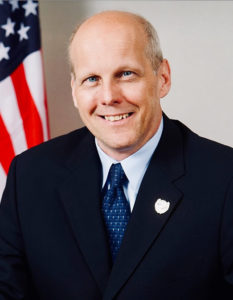Morris Towns Receive Nearly $1 Million in State Recycling Grants
Published on January 16, 2020
DEP Grants Provide Seed Money to Enhance Recycling
Morris County's 39 municipalities will receive nearly $1 million in state recycling grants from a pool of $14 million, announced recently by the state Department of Environmental Protection.
The DEP "tonnage grants'' reward municipal and county governments based on 2017 recycling numbers(the latest available statistics), according to DEP Commissioner Catherine R. McCabe. The grants, she said, are to be used to help implement and enhance local recycling efforts. (PNG, 45KB)
(PNG, 45KB)
Each year, recipients use these grants to improve recycling efforts through a variety of initiatives, such as providing recycling receptacles in public places, upgrading recycling drop-off centers, conducting education and outreach, implementing curbside recycling pickup programs, and funding recycling coordinator positions.
The Morris County pool totaled $937,853. Parsippany received $179,993, followed by Florham Park, $50,634; Randolph $48,085; Montville $47,579; Roxbury $46,012, Rockaway Township $45,613; Denville $42,283; and Mount Olive $38,958. (See below for the full list.)
The annual recycling tonnage grants are awarded through the state's Recycling Enhancement Act, which authorizes a $3 per-ton surcharge on trash disposed at solid waste facilities. The fees are returned to the municipalities for use in improving local recycling.
 (JPG, 197KB) Freeholder John Krickus
(JPG, 197KB) Freeholder John Krickus
"Recycling is one easy way for Morris County residents to directly make a positive impact on our environment here in the county every day," said Freeholder John Krickus, who is liaison to Morris County Municipal Utilities Authority, which handles recycling for about half of the county. "Recycling creates jobs and clean communities, which enhance the quality of life in each of our 39 towns."
When in doubt, throw it out says County MUA
Knowledge is the key to successful recycling: Recycle only those materials acceptable to your town's collection service. Contaminants such as plastic bags, dirty food containers and unmarked plastics cause problems at the processing facilities and lower the value of all of the recyclables, according to MUA district recycling coordinator Liz Sweedy. For more information, visit the MUA website.
Below is a list of municipal tonnage grants:
2019 Tonnage Grants
| Municipality |
Grant Amount |
| BOONTON TOWN |
$17,353 |
| BOONTON TWP |
$6,135 |
| BUTLER |
$9,416 |
| CHATHAM BORO |
$19,606 |
| CHATHAM TWP |
$12,276 |
| CHESTER BORO |
$4,574 |
| CHESTER TWP |
$10,084 |
| DENVILLE |
$42,283 |
| DOVER |
$15,692 |
| EAST HANOVER |
$31,826 |
| FLORHAM PARK |
$50,634 |
| HANOVER |
$28,670 |
| HARDING |
$4,095 |
| JEFFERSON |
$26,124 |
| KINNELON |
$10,890 |
| LINCOLN PARK |
$12,847 |
| MADISON |
$25,673 |
| MENDHAM BORO |
$5,741 |
| MENDHAM TWP |
$7,498 |
| MINE HILL |
$4,521 |
| MONTVILLE |
$47,579 |
| MORRIS TWP |
$24,830 |
| MORRIS PLAINS |
$14,047 |
| MORRISTOWN |
$32,870 |
| MOUNTAIN LAKES |
$6,282 |
| MOUNT ARLINGTON |
$7,256 |
| MOUNT OLIVE |
$38,958 |
| NETCONG |
$8,712 |
| PARSIPPANY |
$179,993 |
| LONG HILL |
$7,974 |
| PEQUANNOCK |
$23,448 |
| RANDOLPH |
$48,085 |
| RIVERDALE |
$16,471 |
| ROCKAWAY BORO |
$5,826 |
| ROCKAWAY TWP |
$45,613 |
| ROXBURY |
$46,012 |
| VICTORY GARDENS |
$2,496 |
| WASHINGTON |
$8,479 |
| WHARTON |
$26,984 |
Overall, New Jersey in 2017 generated 23.4 million tons of solid waste, which includes municipal waste plus construction debris and other types of non-municipal waste. Of this, 14.1 million tons were recycled. However, there was a decline in recycling of household waste/curbside trash.
 (JPG, 40KB) Plastic bags, Styrofoam, package wrap, wire, squeezable yogurt packages and fast food drink cups are some of the items that contaminate the recycling stream.
(JPG, 40KB) Plastic bags, Styrofoam, package wrap, wire, squeezable yogurt packages and fast food drink cups are some of the items that contaminate the recycling stream.
The DEP attributes that 4-percent decline to manufacturers of consumer products, such as drink bottles, continuing to shift to lighter materials such as plastic-over-glass. Manufacturers are also using thinner and lighter-weight plastics. In addition, the volume of newspaper recycled continues to shrink as consumers increasingly rely on smartphones, tablets, and other electronic devices for information.
The 2017 recycling rate does not yet fully reflect challenges that recycling programs in New Jersey and across the nation have been facing since mid-2017 as China and other nations started rejecting "contaminated'' recycling shipments that are with trash and non-recyclable items.
Some examples of contaminants are plastic bags, syringes, auto parts, non-recyclable types of plastic, Styrofoam cups, improperly rinsed and cleaned food containers, and food packaging that can't be cleaned such as soiled pizza boxes, and trash.